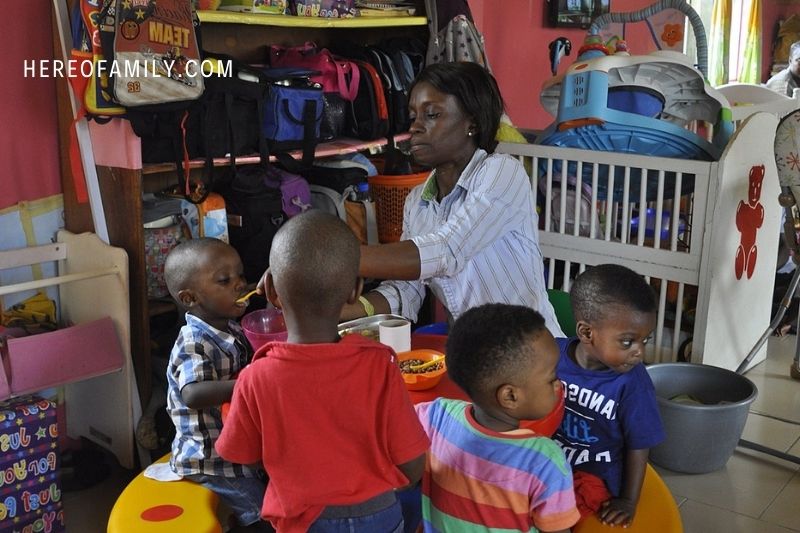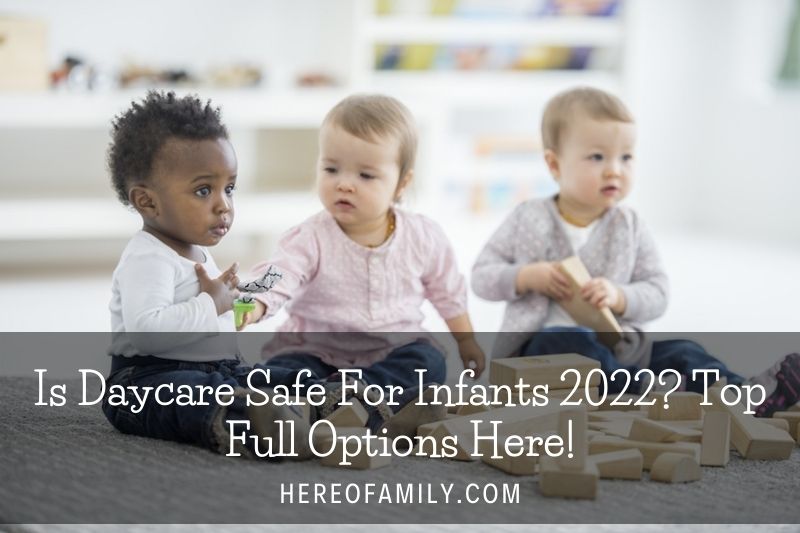- No Voice
Is daycare safe for infants? As a parent, you want what is best for your child. When it comes to childcare, you want to make sure your little one is in safe hands.
According to the Centers for Disease Control and Prevention (CDC), right daycare is safe for infants when caregivers follow recommended health and safety practices. However, there are some health risks associated with daycare, such as exposure to infectious diseases and injuries.
Contents
First Of All, Are Day Cares Even Open?

In the spring, at least 17 states compelled child care facilities to close completely or partly, while more than half of the states proposed some limitations. At the same time, there are still many suggestions. According to Javaid Siddiqi, president and CEO of the Hunt Institute, a North Carolina-based education charity, no legal orders are ordering any closures.
However, “open does not translate or equal to flourishing,” according to Dr. Siddiqi.
ChildCare Aware of America, a nonprofit advocacy organization for providers, revealed that nationally, 35 percent of nonresidential child care centers open and 21 percent of in-home child care facilities operational before the epidemic had closed by July.
Dr. Siddiqi said that providers are fighting to fill the restricted number of available spaces among operating institutions. They, too, are battling to keep afloat.
The National Association for the early childhood education of Young Children conducted a poll of roughly 200 providers in September and discovered that 69 percent of in-home child care and 46 percent of nonresidential child care facilities had taken on more debt to remain operational.
When Babies Can Start Daycare

When to enroll your kid in daycare is in person choice that may be influenced by a variety of variables, including:
- Your parental leave duration
- The capacity of your spouse to take time off
- Your financial obligations
- Whether you have choices for daycare, such as family members
Although newborns may begin daycare options as early learning as six weeks, many experts think that the longer you can wait, the better. This gives you free time to form a stable relationship with your all the kids, mend the umbilical cord, figure out feeding and sleeping routines, and adapt to your new life.
Waiting lists till the infant is older kids is not always an option since many working parents have unpaid leave and their many families depend on their income.
Many daycare centers will not accept newborns under the age of six weeks, and many facilities are not prepared to manage the unique requirements of preterm or medically compromised infants.
There are, however, various methods to guarantee that these infants are well-cared for a while you are at work.
There are other children choices to consider, including in-home care providers, family members, and nannies or au pairs.
When assessing daycare safety, check whether the center is certified per state standards, has manageable group sizes, keeps transparent care and discipline policies, and allows parents to check in on kids easily.
Types of Infant Daycare to Consider
When it comes to child care for your newborn, you have various options. Although facilities that care for groups of children grow often do not take newborns under the age of six weeks, other kinds of daycare center providers may be ready to accept them at a younger age.
Childcare Centers
Child care centers provide care and supervision for groups of babies and children generally split by age.
Childcare Center Advantages:
- If a teacher or helper becomes ill or has an emergency, the center does not shut.
- They must adhere to state licensing standards for cleanliness and safety.
- Your kid will interact with a wide range of adults and children, which will aid their social development.
- Your youngster will get used to a regular schedule where everything happens simultaneously each day.
Child care facilities are the most regulated childcare option, with set drop-off and pick-up hours, restrictions concerning whether ill children may be taken to daycare center, and additional costs for particular services. Furthermore, some facilities exclusively offer full-time care.
Family Childcare Homes
This sort of setup, also known as in-home daycare, is similar to a childcare center in that your infant will be in a small group environment. They will, however, be cared for in the provider’s house, which may be a less organized atmosphere than a daycare establishment.
This arrangement may appeal to you since having a little less rigidity might be more home-like than the structured routine often seen in daycare facilities.
Advantages of in-home care include:
- They are often less costly than daycare establishments.
- If they exist, they must fulfill state criteria (if they exist), which vary from those for childcare establishments.
- A home-like atmosphere in which your infant gets care from loving people and interacts with children of all ages.
- Your schedule may be more flexible, enabling you to drop off or pick up at different times.
- Certain in-home caregivers provide part-time care.
- Infants under the age of six weeks may be accepted.
Babies flourish when they get a lot of one-on-one attention from a single caregiver so that in-home daycare might be excellent. There are usually just a few infants per caregiver, and the caregiver can react promptly to the babies’ needs.
Nannies
Your baby is cared for at home settings by nannies. They may either reside with you (in which case they are known as au pairs) or come in daily or as needed. A nanny may provide your kid with extra one-on-one adult attention and customized activities depending on your preferences.
On the other hand, hiring a nanny is sometimes the most costly approach to arranging care for your newborn since you pay extra for your kid to get specialized attention.
A nanny share, in which you and another parent employ a nanny to care for both of your children in one of your houses, is an excellent method to decrease costs in half. You still get careful care for your child, but at a lower cost to you.
Advantages of employing a nanny:
- More schedule freedom
- More say over the kind of care your kid gets
- Individualized care for your child Improved consistency and continuity of treatment.
- You and your kid will benefit from the convenience.
When hiring a nanny, keep in mind that if they become ill or have automobile issues, you may have to adjust your schedule or make other childcare arrangements at the last minute.
Nannies are not required to complete any educational or health certification standards. If it’s crucial to you that your nanny understands baby CPR or has other credentials, you’ll have to verify this (as well as check their references).
Many working-from-home parents prefer to have their newborns cared for by a nanny so that their baby may be nearby all day. Nannies are growing more popular than ever before, with more home-based employment accessible.
What To Look For In Infant Daycare
When visiting an infant childcare facility, be careful to inquire about the following:
- Qualifications of the personnel
- The infants-to-caregivers ratio
- The day’s structure The licensed center qualifications
Babies, too, need a clean and safe environment as they begin to explore their surroundings.
The American Academy of Pediatrics (AAP) offers connections to certification organizations for many parents looking for excellent childcare for their newborns.
The National Association for the Education of Young Children (NAEYC) recommends a one-to-four-baby ratio in groups of no more than eight newborns.
It is critical for infants 18 months and younger to form attachments with caregivers. The most critical factor at this point is continuity of care. Babies need time to form attachments to and trust those who care for them.
Infants may flourish in daycare if they get enough attention, love, lively interaction with caregivers, and exposure to various linguistic experiences.
A good caretaker will be attentive to a baby’s requirements, feel comfortable showing love to infants, and grasp the phases of child development.
Parents may be worried about their children’s long-term implications from being put in daycare at such a young age. A 2017 research, on the other hand, discovered that young children in early childcare facilities who received high levels of emotional and behavioral support demonstrated enhanced social competence a year later.
Regardless of how many days per week the youngsters attended childcare, this favorable impact was seen.
A Word From Verywell
The first few days and weeks after your infant begins daycare may be challenging. You can be anxious, terrified, or envious. All of these emotions are natural, and as you get more at ease with the daycare provider and realize that your kid is adequately cared for, you should begin to feel better about your choice.
However, if you have any reservations, go with your gut impulses. You are not obligated to any daycare arrangement indefinitely, and you must do what is best for you and your family.
Some relevant posts:
- Does Baby Powder Cause Cancer? Complete Guide 2023
- Best Baby Breathing Monitor: Keep Baby Safe and Sound 2023
- Is Wifi Safe For Babies? Top Full Guide 2023
- How To Help Choking Baby? Top Full Guide [2022]
- Check Neighborhood Safety 2023: Top Full Guide
Conclusion
In recent years, there has been a lot of debate over whether or not daycare is safe for infants. Some parents worry that their child will be exposed to too many germs, while others worry about their child’s quality of care. While no one answer is right for every family, there are some things you can do to help make sure your child is safe and healthy while in daycare.
